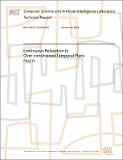continuous Relaxation to Over-constrained Temporal Plans
Author(s)
Yu, Peng
DownloadMIT-CSAIL-TR-2018-012.pdf (3.851Mb)
Other Contributors
Model-based Embedded and Robotic Systems
Advisor
Brian Williams
Terms of use
Metadata
Show full item recordAbstract
When humans fail to understand the capabilities of an autonomous system or its environmental limitations, they can jeopardize their objectives and the system by asking for unrealistic goals. The objective of this thesis is to enable consensus between human and autonomous system, by giving autonomous systems the ability to communicate to the user the reasons for goal failure and the relaxations to goals that archive feasibility. We represent our problem in the context of over-constrained temporal plans. They are commonly encountered while operating autonomous and decision support systems, when user objectives are in conflict with the environment. Over constrained plans are addressed by relaxing goals and or constraints, such as delaying the arrival time of a trip, with some candidate relaxations being preferable to others. In this thesis we present Uhura, a temporal plan diagnosis and relaxation algorithm that is designed to take over-constrained input plans with temporal flexibility and contingencies, and generate temporal relaxations that make the input plan executable. We introduce two innovative approaches within Uhura: collaborative plan diagnosis and continuous relaxation. Uhura focuses on novel ways of satisfying three goals to make the plan relaxation process more convenient for the users: small perturbation, quick response and simple interaction. We have incorporated Uhura within an autonomous executive that collaborates with human operators to resolve over-constrained temporal plans. Its effectiveness has been demonstrated both in simulation and in hardware on a Personal Transportation System concept. We believe that Uhura's collaborative temporal plan diagnosis capability can benefit a wide range of applications, both within industrial applications and in our daily lives.
Description
SM thesis
Date issued
2013-01-25Series/Report no.
MIT-CSAIL-TR-2018-012
Keywords
Over-constrained temporal plan, Plan diagnosis, Mixed initiative planning